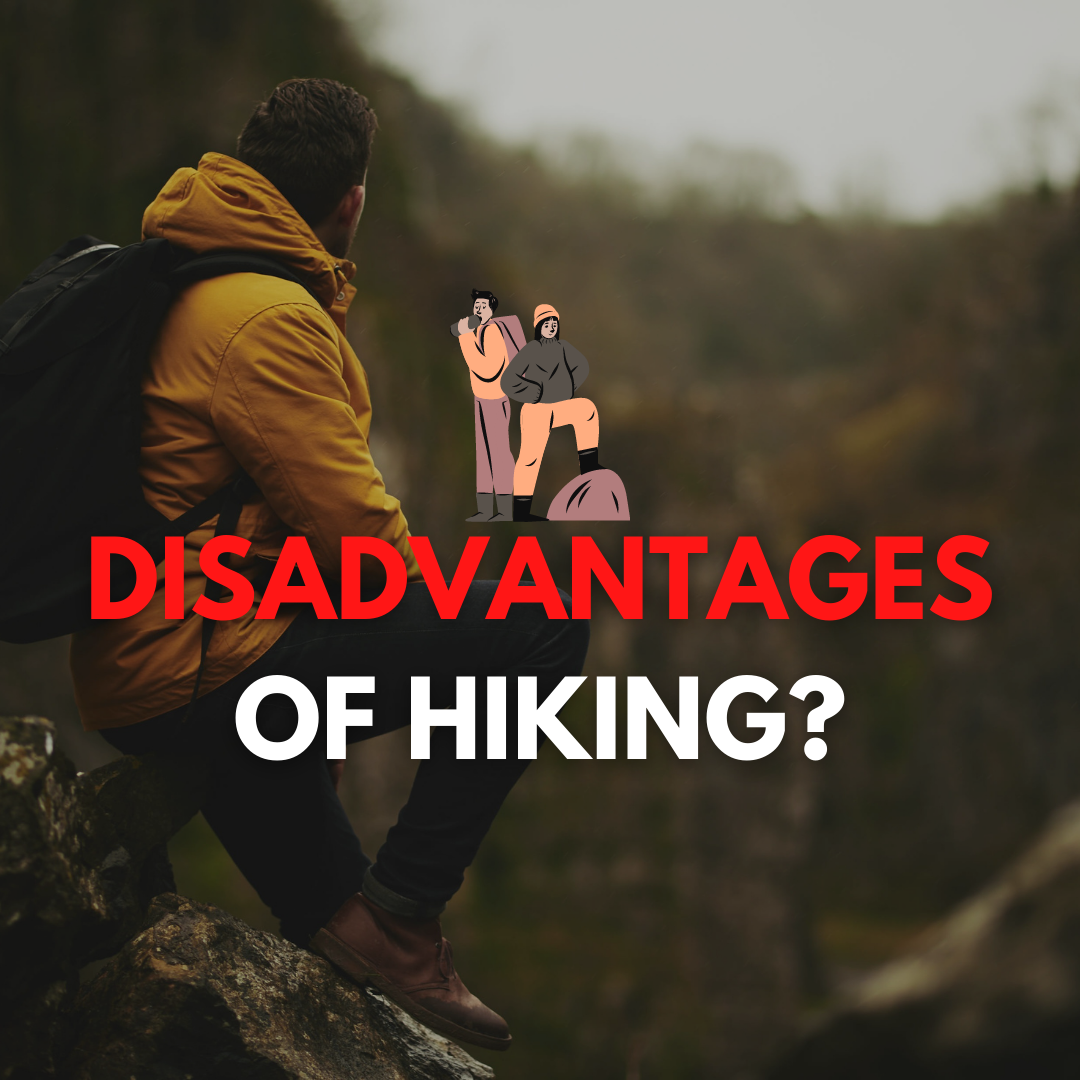Disadvantages of Hiking (The Truth & The Unpleasant)

So, I wanted to kind of go against the grain a bit with this article (but I mean, this site is all about helping people make informed decisions about hiking). Sure, there are some amazing benefits to this activity, but there are also a few drawbacks (and some that can actually be downright dangerous) that I think it’s important to be aware of.
So in this article, I’ve put together a list of 8 disadvantages of hiking that you should keep in mind before packing your bag, lacing up your boots, and heading out on the trail.
Quick Links
1. You May Get Lost
One of the unpleasant aspects of hiking is that it’s easy to get lost if you don’t pay attention. Even experienced hikers can find themselves lost in unfamiliar terrain. Make sure you bring a detailed map and compass and know how to use them properly before heading out. Phone service is usually pretty nonexistent once you’re in the backcountry, so having a map/compass is essential for navigation.
But let’s face it – getting lost is part of the adventure sometimes. I remember when I was a young boy exploring parks and actually HOPING that I would get lost, so I had more time to explore. It can be a great learning experience if you’re prepared and know the right safety steps to take. Now that I’m a father, I’m a BIT more cautious!
2. You Could Get Injured
Hiking can be hard on your body if you’re not prepared for it. Twists and strains, cuts and bruises – all of these are common risks when tackling difficult trails or exploring new terrain. The most common hiking injury is a fall, which accounts for nearly 50% of all hiking accidents.
Yes, accidents can happen anywhere, but if you’re just looking STRICTLY for a physical outlet – there may be better alternatives to minimize the risk of potential injuries. Even walking in nature or going running may suit you better if you’re not looking for the same exploration or challenge that comes with hiking.
3. You Need To Be Physically Fit
Hiking can be a great physical workout, but it requires you to have some level of physical fitness. If you’re not in good shape, the terrain and elevation changes can make hiking very difficult.
I thought I was in pretty good shape until I started hiking regularly. You need to be able to carry a heavy pack, traverse rough terrain, and move quickly to reach your destination in time. Now don’t get me wrong – you don’t need to be the picture of health to participate in hiking, but it does require you to have some physical fitness. If you want specifics, hiking makes heavy use of your core and your legs – so if you’re going to become a regular hiker, make sure those are strong! (The plus side? You get to improve them!)
Above all else – make sure you don’t push yourself too hard or too far if you’re not ready for it! There’s no sense in pushing yourself into an unsafe situation that could have been avoided.
4. It Can Be Expensive
Hiking can be an expensive hobby depending on the type of equipment you buy and where you’re going. If you’re traveling overseas or to a remote location, there are often additional costs such as flights, lodging, and meals that need to be taken into account – and let’s face it, once you start hiking locally, you’re going to want to start exploring all the beautiful national parks and forests that the US has to offer!
So, if you’re on a budget or just looking for ways to save money – look into finding local trails and parks near your home. There are usually plenty of free options out there (or at least less expensive ones) that can still provide an enjoyable experience.
5. You’re Exposed To The Elements
Hiking often requires you to be outdoors for long periods of time and exposed to the elements. This can include extreme temperatures, sunburns, windburns, bugs, and much more. Be sure to plan ahead and bring appropriate clothing for the weather conditions you’ll be encountering.
Most people jump blind into hiking trips and don’t think about the weather conditions or terrain – and this can lead to some really uncomfortable situations. You don’t want to be stuck in a snowstorm without proper gear or go hiking when it’s 100 degrees, with no shade, and be exposed to heat stroke.
6. Wildlife Encounters Can Be Dangerous
While encountering wildlife can be an awesome and beautiful experience, the reality is that wildlife encounters can also be dangerous. Make sure to research the local wildlife before you go and know what to do if you come across any animals. Know how to respond in case of a bear attack or other predators, and never approach wild animals.
I won’t get into it all here since there is too much to cover, but in general, always give animals plenty of space and respect their habitats! If you’re going to a place that has dangerous wildlife, make sure to take all the necessary precautions and never do anything that could put you in danger.
If you’re interested in learning more about specific wildlife and how to handle encounters, I put together a pretty exhaustive list of resources that you can check out below:
- Alligator
- Black Bear
- Brown Bear (Grizzly Bear)
- Bobcat
- Coyote
- Deer
- Moose
- Mountain Goat
- Mountain Lion
- Wild Boar
- Wolf
7. You Need To Prepare For Emergencies
No matter how prepared you are, the outdoors can be unpredictable – and that means anything can happen when you’re out there! It’s important to make sure you are prepared for any potential emergencies that could arise on your hike.
Make sure to bring a first aid kit, a whistle, and a map of the area. You should also notify someone back home of your whereabouts before you leave and make sure to bring enough water and snacks in case you get stuck or lost. By planning ahead and being prepared for any situation (no matter how unlikely it may seem), you can ensure that you have a safe and enjoyable time on the trails.
As I said, once you’re out there – there most likely won’t be any cell phone service. If you’re trapped in a dangerous situation such as mudslides, flash floods, or rockslides – don’t panic and stay calm. It’s important to remember that help may be far away, so it’s best to stay put if possible and try to signal for help if necessary. While not entirely necessary, there is something called a Personal Locator Beacon that you can buy, which will send an SOS signal to the authorities if you find yourself in an emergency situation.
8. It’s Hard To Use The Bathroom
When you go out on a long hike, it’s important to keep in mind that finding a restroom can be difficult. If you’re planning to go for an extended period of time and there are no restrooms nearby or along the route, make sure you are prepared with the necessary supplies to go to the bathroom in the wilderness.
When nature calls, make sure you are away from water sources and trails – it’s important to practice Leave No Trace principles and make sure you aren’t leaving a huge mess behind! Be prepared with hand sanitizer and toilet paper – even if it means bringing your own when necessary. If you want to learn more about what to do in this situation, check out this resource on how to do your business when out in the wilderness.
So Is Hiking Worth The Trouble?
Yes! Despite the potential for danger, hiking can be an incredibly rewarding and enjoyable experience if you do it responsibly. There are so many incredible places to explore and amazing sights to see – just make sure you go prepared and stay safe!
As long as you prepare ahead of time and take the necessary precautions, there is no reason why you can’t have a fantastic time out in nature – so get out there and start exploring!
As a matter of fact, despite the “disadvantages” or “drawbacks” of hiking, there are NUMEROUS positives and advantages. I won’t name them all, but here are a few:
- Great for your physical fitness: Hiking is great for your entire body, especially your glutes!
- Increase in happiness: Being out in nature can help boost your mood by releasing endorphins – the “happy” hormones!
- Great for your brain: Research has shown that hiking can help reduce stress and anxiety and improve your memory, focus, and attention.
- Time to explore: Hiking gives you the opportunity to take in the beautiful sights and sounds of nature – from rivers, streams, mountains, and more!
- Great for your heart health: As mentioned earlier, hiking is a great form of cardio exercise that can help improve your heart health.
- The chance to disconnect: With no cell phone signal or internet access on most trails, hiking gives you a chance to disconnect and practice mindfulness.
And these are just a few of the many advantages and benefits of hiking.
Conclusion
As I said, the purpose of this article wasn’t to scare or put you away from hiking; my intention was actually the contrary – to provide an honest look at the potential dangers of hiking and to make sure you are prepared for any situation that may arise.
Hiking can be a wonderful experience if done responsibly and with some preparation. Just remember the basics: take precautions, plan ahead, and stay safe. With just a little bit of effort, I mean just a tiny bit of effort, you can have an incredible experience out in nature.
So now that you know some of the disadvantages and hopefully some of the advantages and benefits, you can make an informed decision on whether or when to go hiking.






